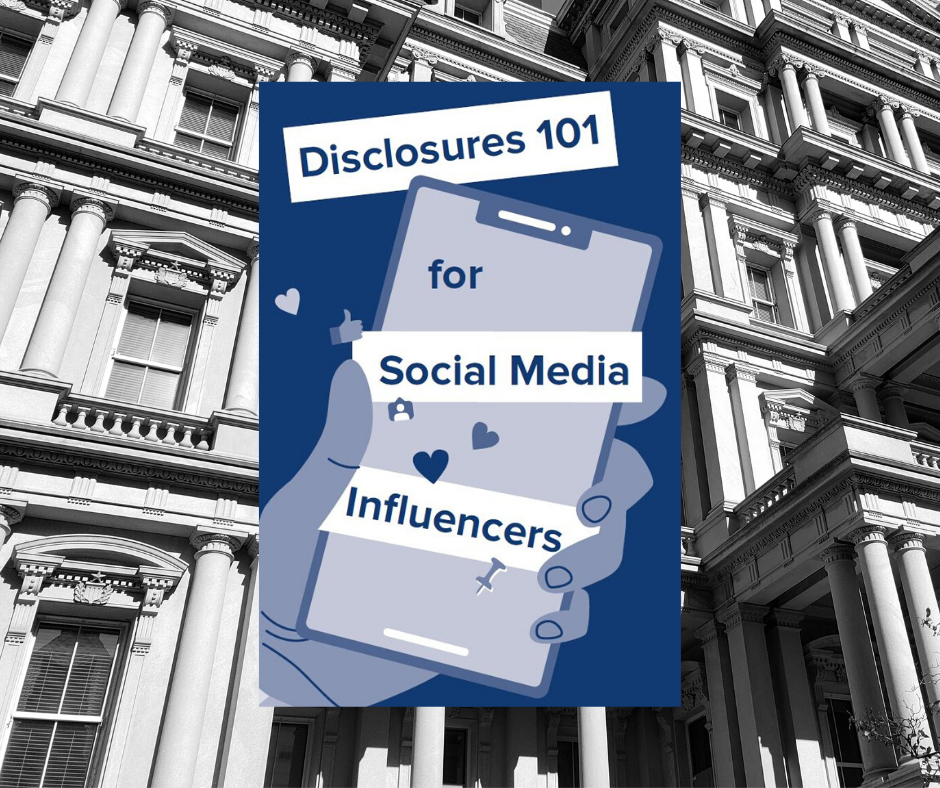The Federal Trade Commission (FTC) has released Influencer Disclosure Guidelines to provide an ethical and legal roadmap for social media personalities. The FTC is an independent enforcement arm of the U.S. government tasked with consumer protection. Part of this enforcement mandate is to ensure truth in advertising, which includes endorsements. Influencers and brands that collaborate through endorsements are expected to comply with the law. We’ve reviewed the guidelines and have 6 takeaways to ensure that your social strategy avoids the wrath of the FTC.

1. Influencers don’t need to be paid to have an obligation to disclose.
In the Influencer Disclosure Guidelines, the FTC defines the endorsement as “any advertising message… that consumers are likely to believe reflect the opinions, beliefs, findings, or experiences of a party other than the sponsored advertiser.” This is an incredibly broad definition but it thoroughly encompasses all types of endorsement.
If a good, service, and currency is exchanged for “endorsement” by an influencer, they are required to disclose that they are being compensated. This can be as simple as a #sponsored or #advert.
2. The truth will set you free.
An influencer is expected to be truthful in their endorsements. This means that the individual must have tried or used a product before making statements about it. It also means that if they think the product is terrible or problematic, they shouldn’t say it was wonderful.
This also means that the endorser shouldn’t make claims without proof. Things can get gray quickly around things like supplements, medicines, and other health products.
3. The first Influencer/UGC FTC enforcement cases have already begun.
The Influencer Disclosure Guidelines seem to have been prompted by recent enforcement actions. In October, two enforcement cases were engaged by the FTC.
The first involved fake product reviews created by a makeup company. The company asked its employees to create fake profiles and review products. The company involved was not fined but the agreement consent order containing their penalty establishes a recordkeeping standard that will haunt them for the next two decades.
Included in the consent order:
- The respondent must keep and maintain records for 20 years after the issuance of the order including every unique marketing advertisement or piece of collateral.
- The FTC may visit, interview, and audit any person, partner, or record during that 20 year period.
- Any information recorded as part of the reporting standard is done so under risk of federal perjury which can hold up to a 5-year prison sentence for every instance of perjury in addition to fines.
The second company sold “fake indicators of social media influence” including followings, views, and likes across a variety of platforms. This was a violation of the FTC Act Section 5(a) which prohibits deceptive acts in commerce. The order against this organization was much more punitive.
The order requires:
- Organization never against sells “social media influence”.
- Company penalty of $2.5 million dollars.
- Individual defendant to pay a penalty of $250,000.
- A permanent restraining order against using or maintaining any past customer information.
- Compliance reporting and recordkeeping for 10 years.
Both cases were settled with the FTC. You can read more about them in the Commission’s press release.
4. Best Practice is to disclose early and often.
The rule of thumb is to make a disclosure easy to find and hard to miss.
The FTC also makes these recommendations:
- Don’t mix disclosure hashtags like #ad #sponsored #advertising in with a group of hashtags.
- Don’t put the disclosure in a place that requires a viewer to click or interact in order to see it.
- Video that includes endorsements should mention disclosure language audibly and visually multiple times in the same piece of content.
- Don’t use confusing or vague terms to indicate sponsorship. “Ambassador” is not enough.
Maybe the most interesting recommendation in the Influencer Disclosure Guidelines is “Don’t assume that a platform’s disclosure tool is good enough.” Adding your own disclosure provides an additional layer of protection.
5. The FTC will not tolerate dubious UGC or Influencer Marketing.
It generally takes a bit of time for government and policy to catch up to the swiftly moving digital landscape. But when it does catch up, it holds its position with a vengeance. The conversation about the role of the FTC in social media and influencing is best summarized by Andrew Smith, Director of the Federal Trade Commission’s Bureau of Consumer Protection.
“Dishonesty in the online marketplace harms shoppers, as well as firms that play fair and square,” said Smith. “Posting fake reviews on shopping websites or buying and selling fake followers is illegal. It undermines the marketplace, and the FTC will not tolerate it.
6. The Influencer Disclosure Guidelines are just the beginning.
The Influencer Disclosure Guidelines and first social media FTC enforcement actions just took place in October 2019. This is just the beginning. Rules will change quickly as state, federal, and case law shifts. Marketing and communications professionals will need to keep an eye on the legal expectations if they plan to deploy strategies in this space.
Rights Management and the deployment of quality user generated content has never been more important. Schedule time today to discover how TINT has helped the world’s top brands protect themselves with tools like machine-learning aided discovery, copyright detection, and permission to use social content outside the feed.



